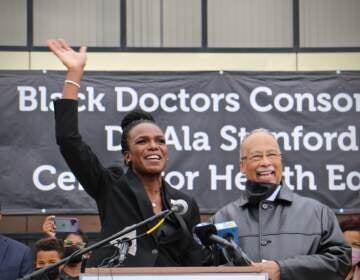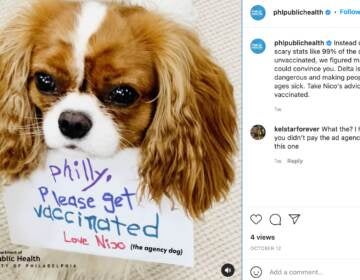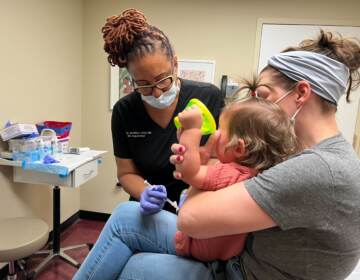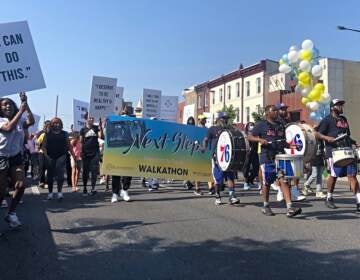Dr. Ala Stanford no longer vying to be Philly’s next health commissioner, citing potential conflict
Dr. Ala Stanford cited a commitment to opening a new primary care clinic, and a potential conflict of interest, as reasons for her withdrawal.
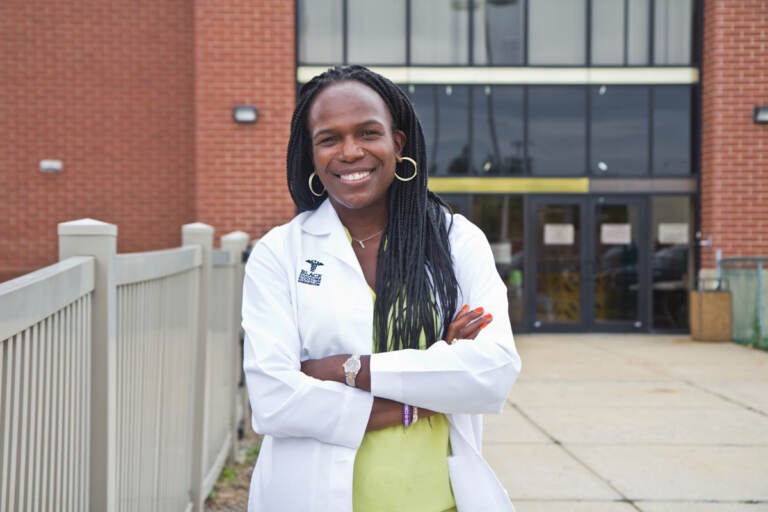
Dr. Ala Stanford, founder of the Black Doctors Consortium, in front of the site of their new health equity center opening in October 2021. (Kimberly Paynter/WHYY)
Dr. Ala Stanford, who had been among the finalists to be Philadelphia’s next health commissioner, withdrew her name from consideration Friday.
Stanford announced her decision late Saturday as she prepares to open the Dr. Ala Stanford Center for Health Equity or ASHE, a new primary care clinic geared towards equity in North Philadelphia. She cited her commitment to ASHE, and a potential conflict of interest, as reasons for her withdrawal.
“I don’t want any funds or resources to be blocked [from] folks who need it the most because of any potential conflicts of interest with me being health commissioner,” Stanford told WHYY News. “So to remove any of that, I withdrew.”
ASHE, located at Deliverance Evangelistic Church, will begin receiving patients Wednesday. The city may become a major source of funding for the center, Stanford said. The clinic serves a similar role as a city health center, which may make it eligible to become a line item in the city’s budget, Stanford added.
Before opening ASHE, Stanford gained widespread recognition for founding the Black Doctors COVID-19 Consortium at the onset of the pandemic. It focused on providing access to coronavirus testing and vaccinations to some of Philadelphia’s most vulnerable residents, including Black residents, who were disproportionately impacted.
Stanford had been under serious consideration in a national search for Philadelphia Health Commissioner. The city’s previous health commissioner, Dr. Thomas Farley, resigned in May after he admitted to ordering the cremation and disposal of remains of some of the victims of the 1985 MOVE bombing in 2017, without notifying the victims’ family members. Dr. Cheryl Bettigole, who is also vying for the permanent job, was named acting health commissioner.
In a statement, Stanford said she realized during the recent ribbon cutting that her presence at the fledgling clinic is “integral.”
“Philadelphia was named the number one city in the nation for vaccinating people of color, largely African American, of all urban areas in the United States and I attribute that largely to our work,” she said. “The Mayor and Philadelphia City Council have pledged their support toward sustainability of our work as we share a common goal to promote health and prevent disease in our communities.”
Beyond coronavirus testing and vaccinations, the clinic will provide other immunizations and flu shots, wellness checkups, mental health care, X-rays, and blood draws for lab tests.
Stanford cited common health issues plaguing many of the city’s predominantly Black communities as reasons for continuing her work long after the pandemic is over — leading causes of death like heart disease, cancer, and casualties, referring to victims of violence and the loved ones they may leave behind.
“What we’ve done is really a national model of what could be done to reduce the health disparities that plague those who are socially and economically disadvantaged,” Stanford said. “I know I need to be present to see that through.”
Since April 2020, the Black Doctors Consortium has tested more than 25,000 people for the coronavirus, and it has vaccinated more than 50,000 Philadelphians, according to the consortium.
ASHE will accept all forms of insurance and will provide care on a sliding scale for people who are uninsured, the center said.

Get daily updates from WHYY News!
WHYY is your source for fact-based, in-depth journalism and information. As a nonprofit organization, we rely on financial support from readers like you. Please give today.


